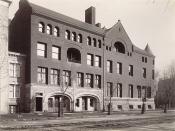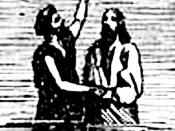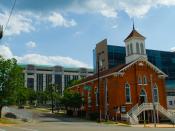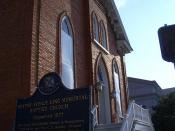The differences in the Dexter Avenue and First Baptists' organizational structures can be classified into two categories; formal and informal. Dexter Avenue was a church in which the role of the pastor did not necessarily mean total power or control over the members. The members decided what orders and requests they would or would not follow. Johns believed strongly in "Negro spirituals." At one time he requested the organist to play a spiritual, which she refused because "it was not done at Dexter"(Branch p.11). The congregation as well as Johns did not believe in emotionalism. "There was no shouting at Dexter, nor any responsive Amen's"(Branch p.11). First Baptist however, would have never refused such a request by their minister. Their conviction was one that the members were considered "children," and that they were to behave to as such to the "ruler," better known as the preacher. There was no church democracy at First Baptist.
Johns stressed the importance for the members to be less concerned with vanity and more so with ending segregation. Johns fought segregation at two levels, race and class. Johns preached that Negro's must not "cling to titles and symbolic niches instead of building an economic base from which to deal more equally with whites as well as with themselves"(Branch p.16). He wanted the members of his church to not think of themselves as "above" common people. In order to bring about change, or to be considered equals, they must be farmers or business workers, for without any Negros in such positions, they were deemed unnecessary in the business world. First Baptist was more formally structured than was Dexter Avenue. The members of First Baptist took their ministers more seriously. They were not concerned with how they might "look." The congregation at First Baptist built a church with bricks, old or new, obviously with the end result not being a church of outside beauty. Instead, it was that they built it with what they had, for the sole purpose of a place of worship, not concerned with appearances.





